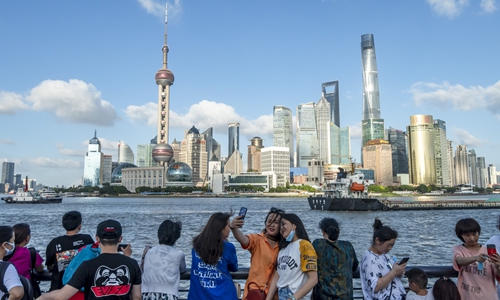China mulls easing limits on overseas insurance and securities trading

Tourists visit the Bund on August 3 in Shanghai, a city leading the way in China's opening-up. Photo: cnsphoto
China will research the feasibility of allowing Chinese residents to conduct overseas insurance and securities trading under the current annual quota of $50,000 for foreign exchange purchase by individuals this year.
In 2021, China will study relaxing limits on personal capital accounts in an orderly manner, including revising management rules concerning how Chinese residents participate in the stock incentive plan of companies listed abroad, according to an article published on the WeChat account of the State Administration of Foreign Exchange (SAFE). The article was written by Ye Haisheng, a SAFE official.
SAFE will also elevate the qualified domestic institutional investor (QDII) quota at a proper time. QDII is the main quota-based system through which Chinese mainland institutions can invest overseas.
Analysts said the move marks a significant step in China's two-way market opening-up and the internationalization push for the yuan.
Dong Dengxin, director of the Financial Securities Institute at Wuhan University of Science and Technology, told the Global Times on Friday that the move signals that Chinese individuals' forex purchases could be used in the capital account in the near future, in addition to the current account under which forex can only be used for such purposes as studying abroad and tourism.
"If the plan comes into effect, it will expand the channels through which Chinese people invest abroad. Currently, the main channels in overseas markets is QDII and Stock Connect programs," Dong said.
He added that the plan could also pave the way for a further loosening of individual forex purchases and the annual $50,000 limit. SAFE has imposed the $50,000 forex purchase cap since 2007.
"The Chinese yuan will be inching closer to being a global freely convertible currency like the dollar and euro," Dong noted.
In the article, Ye said that SAFE will stick to "bottom-line" thinking and guard against systemic financial risks, so as to protect the economic and financial safety of the nation.
Dong warned that Chinese regulators, during the process of two-way capital opening-up, should also keep an eye on illegal capital transfers such as money laundering. He suggested that Chinese authorities could cooperate more with other countries on cross-border capital supervision to guard against such risks.
